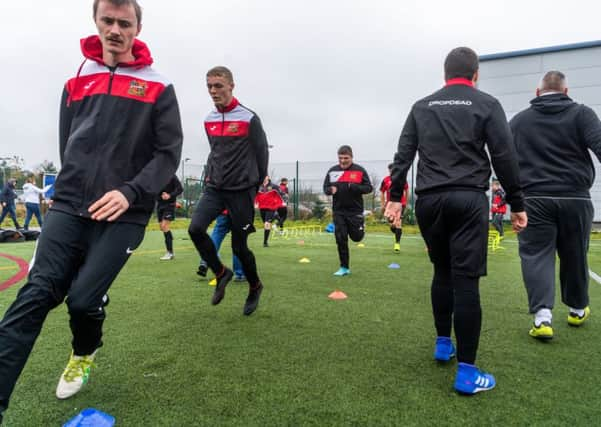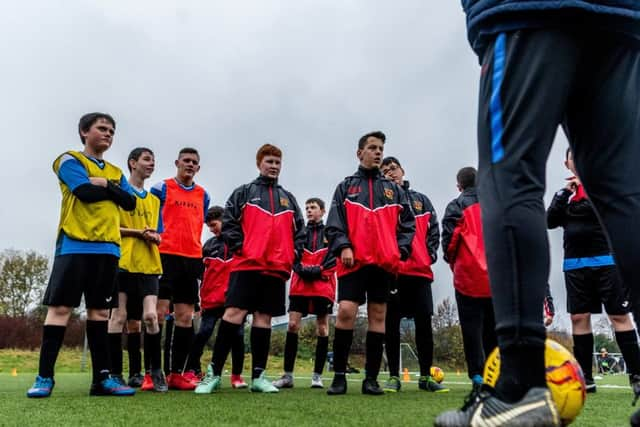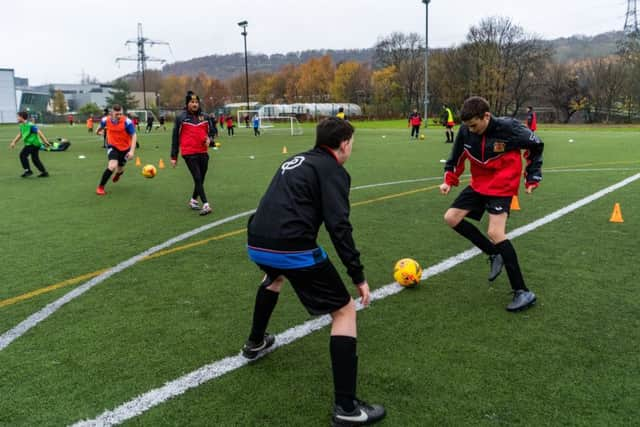How world’s oldest football club Sheffield FC is a leading light in disability sport


Sheffield FC are also setting the standard for disability football. Sheffield FC Disability was formed in 2017, mainly as a means to fill the void left by Sheffield Wednesday’s disability club disappearing after funding cuts. It currently has teams for U12s, U16s and adult teams.
“I’d like to think that we are the most progressive part of the oldest club in the world,” says Peter Donohoe, the club’s chairman.
Advertisement
Hide AdAdvertisement
Hide Ad

The teams are completely inclusive, with people’s backgrounds, ability and type of disability all varying enormously.
Over the years the team has welcomed everyone from amputees to children with cerebral palsy and everyone is guaranteed game time. “I think the big issue is that in mainstream schools there’s thousands of kids with disabilities that can’t access football,” says Donohoe. “That’s fundamentally wrong.”
Max Burgar-Briggs, a 13 year-old striker, who recently scored four goals at a tournament in Bolton, is one such player benefiting from the ethos and set-up of the team. “It gives everyone with disabilities a great opportunity to play football and that’s all we want,” he says. “That’s why we’re an inclusive club and I’m really enjoying it. Everyone gets an opportunity to play and everyone feels included.”
Advertisement
Hide AdAdvertisement
Hide AdFor many people, including Donohoe, their relationship to the club grew from their own children. “Originally, as a dad, I took my son to play and he had no interest in football whatsoever but was very active and likes to be involved in stuff,” Donohoe says.


“I took him along and he loved it but they were struggling for coaches so I went on a level 1 coaching course so that I could help. Then I got a bit more involved and was doing stuff like marketing and became part of the committee and then this year I was voted in as chairman. I run a couple of training sessions a week and take on work like doing the website for the club.”
While the club promotes inclusivity at its heart, it’s also one that is streamlined, organised and professional. An approach that Donohoe feels is important for the players.
Advertisement
Hide AdAdvertisement
Hide Ad“I want to run it not necessarily like a company but something that is more streamlined and organised,” he says. “We’re trying to teach the kids to get better at dealing with their emotions and adhering to rules as much as possible, as well as enjoying themselves.
“We have to be consistent and repeat the rules every session. It’s for the good of the kids, so that they understand the rules and learn some respect. We don’t exclude kids based on behaviour, we try and work with them and help.”
For Donohoe, it’s been clear to see the impact it has on the players across all ages. “I think they get a lot out of it,” he says. “They come week after week and they love it. For us it’s making sure that they feel like they are part of a team and that they want to wear the shirt.
“It’s challenging and it’s something that requires a lot of involvement but it’s hugely rewarding. When I first took my lad, getting him through a session without having a meltdown and storming off or sitting down and crying – that took time. But it’s been amazing to be involved with this group of kids and to see where they are now.”
Advertisement
Hide AdAdvertisement
Hide AdLiam Hallat, 32, plays for the adults team. “It’s good here,” he offers. “They train properly and it’s structured. It feels as much of a family as it does a football club. I’m incredibly proud of being part of Sheffield FC. It’s great to be tied to such a club.”
However, such is the success of the club that they are finding themselves with too many players and not enough coaches or teams to play against.
Scott Gregory looks after the adult team. “We started with five players two-and-a-half years ago,” he reflects. “I decided to help out the adult coaching role and now we have three teams and 28 players. It’s been a great success. We have both juniors moving up through the age bracket but also some coming from other teams. We’re forever growing but more competition would be good.”
Funding is an ongoing issue and other teams have collapsed as a result. “A lot more clubs should be doing this because it benefits people in the community,” Hallat says.
Advertisement
Hide AdAdvertisement
Hide AdAlex Penman, 12, loves playing in tournaments and would love to be able to do it more. “I’d like more teams to play. I feel there should be more around Yorkshire too, not just South Yorkshire. We travelled to Bolton recently to play a team.”
Getting more teams in Yorkshire is something Donohoe would love to leave as his legacy as chairman. “My role as chairman is mainly to leave the club in a better position than where it was,” he says. “The mantra I’ve been trying to put across to the committee is that we have to supersede our own levels so that we can get to a point where we can help other teams get set up. We’re really organised and have a good set-up with a good membership, a really good committee and great parents. We need parents to step forward and do coaching sessions or for professional coaches to get involved and offer some time. I spoke to someone from the Manchester United academy that had been given some hours by the FA to get involved with disability football, so he’s helping clubs and is coming to do some sessions with our coaches.”
Whilst Sheffield FC Disability hope to be something of a successful template that other clubs can look to build their own disability teams from, in the meantime there’s already a lot that the coaches are looking back on with pride.
“It’s massively rewarding,” says Gregory. “Confidence-wise and in terms of communication, I saw massive improvements in my son, too. They all get to play at Sheffield FC’s ground with the floodlights on, the tunnel, the PA system – and they love it. I’d do it anyway because of my son but to see these guys playing for Sheffield FC and their faces is an amazing feeling.”
Advertisement
Hide AdAdvertisement
Hide AdThis is something Donohoe echoes, having seen up close the beneficial impacts that setting up such a club has had on so many people. “Our main objective is letting people know that disability football is a thing and that other clubs should set up,” he says. “People are more aware of disabilities now but I still think for so many, sport just passes them by. It’s such a cliche but sport is a really powerful thing for people to get involved with, especially those who feel marginalised. I’ve seen the power and the beauty of it and our club is testament to that.”